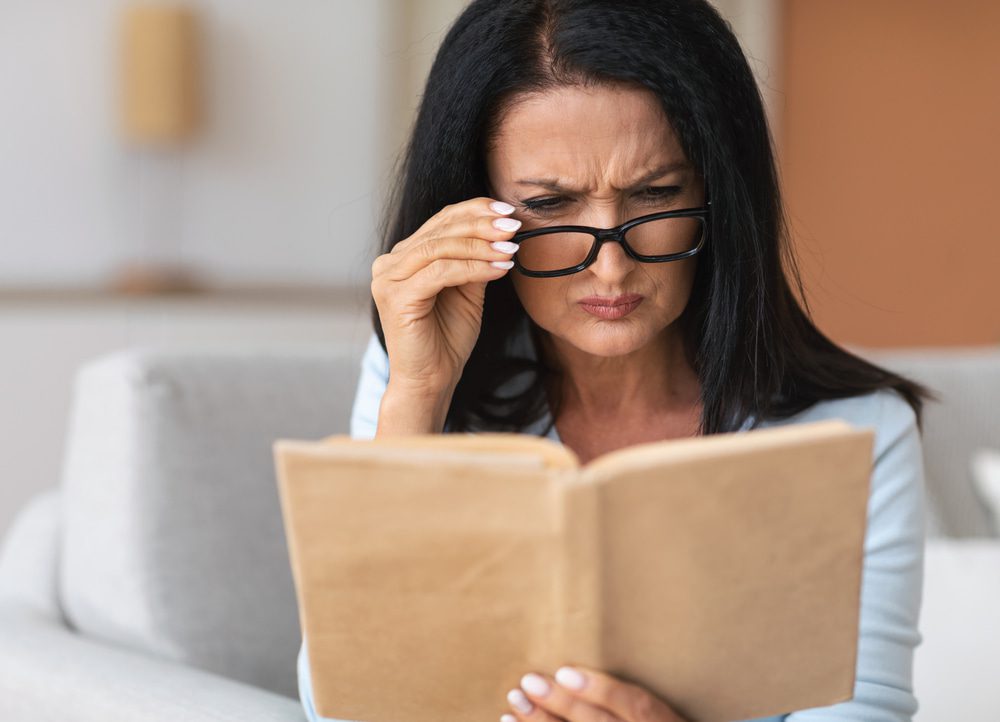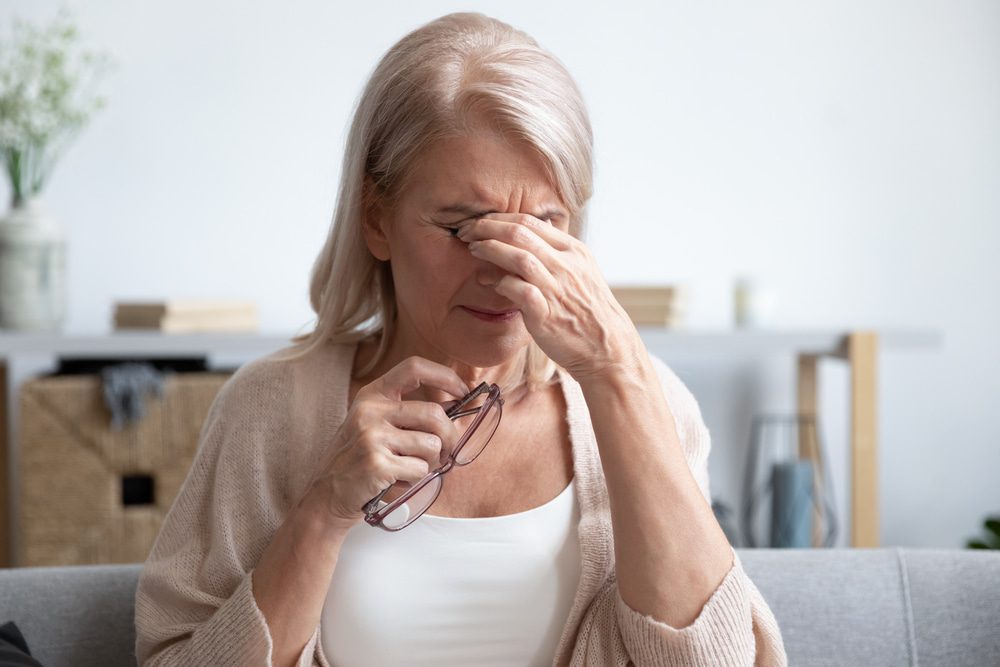Have you found yourself wondering: does vision get worse with age? Just like the rest of our bodies, our eyes change as we get older. Vision-related capabilities we might take for granted in our younger years undergo subtle changes that often go unnoticed. Even those blessed with perfect 20/20 vision will experience eye vision changes with age, such as:
- Decreased peripheral vision
- Sensitivity to light
- Ability to discern contrast
- External factor response time
Your physical condition, heredity, and pre existing issues also play a part in the visual changes you may experience. Certain age-related eye diseases can be managed or corrected as we age, while others may be controlled by factors that are beyond medical intervention. Yearly eye exams in our later years are vital to monitor how age-related vision loss affects us.
The following is a guide to the types of eye vision changes with age that you might experience.

Vision Changes in Your 40s
Does vision get worse with age? Prior to the age of 40, most are lucky enough to not need more than a prescription for glasses or contact lenses. However, beginning at age 40, most begin to experience difficulty focusing on objects that are too close. Presbyopia, or nearsightedness, is a naturally occurring hardening of the lenses of the eyes. Most are able to adjust by holding objects farther away than usual.
Those who have never needed prescription eyeglasses may discover a need for them after 40. Reading glasses may be sufficient, while others may need bifocal or multifocal lenses. Many may find that vision can be corrected through LASIK surgery. If you have not started yearly eye doctor visits prior to the age of 40, this is a great time to start.
Vision Changes in Your 50s
Ask anyone over the age of 50 the question: does vision get worse with age? You will be answered with a resounding yes. During your 50s, presbyopia will naturally increase and changes in your eyeglasses prescription are likely. If you have conditions such as high blood pressure or diabetes, changes to your vision are more noticeable. Your eye doctor will begin to monitor you for age-related vision loss diseases and conditions like glaucoma and cataracts.
Vision Changes in Your 60s and Beyond
Once you reach your 60s, it is not uncommon for a person to develop more serious eye vision changes with age. The following age-related vision loss conditions usually make an appearance after the age of 60.
#1. Dry Eye
Dry eye is most commonly seen in postmenopausal women, although it can affect anyone. When you have dry eye, your tear ducts are not working as well and can fail to properly lubricate the eyes. Dry eye is easily treated with natural tears or ointments that work to relieve burning and stinging associated with this condition.
#2. Cataracts
More than 50% of the U.S. population over the age of 80 suffer from cataracts. Cataracts are blurry spots that develop on the lens of the eye, and are most commonly treated with surgery that alleviates related symptoms and vision impairment. Symptoms of cataracts include:
- Blurred vision
- Reduced night vision
- Double vision
- Light sensitivity
- And more
#3. Glaucoma
Glaucoma is the primary cause of blindness in those over the age of 60. Those who have a family history of glaucoma are more likely to suffer from this silent killer. Regular glaucoma testing is recommended because this ocular disease usually isn’t discovered until some degree of vision loss has already occurred. Glaucoma causes fluid build-up in the eye resulting in damage to the optic nerve, and can be treated with medication or surgery to minimize pressure levels in the eye.
#4. Diabetic Retinopathy
Diabetic retinopathy is a condition where damage to the blood vessels in the retina is caused by high blood sugar levels associated with diabetes. Those with diabetes are at high risk for this condition, and can minimize development by keeping blood sugar levels under control. Early symptoms of diabetic retinopathy can include:
- Poor night vision
- Blurred vision
- Seeing spots
- Single dark spot in center of vision
Depending on the condition’s severity, there are treatment options through eye injections or laser surgery that have proven to be effective. If left untreated, diabetic retinopathy can lead to blindness.
#5. Age-Related Macular Degeneration (AMD)
There are two types of age-related macular degeneration: wet and dry. Both lead to gradual loss of your central vision. Those suffering from AMD may see objects blurred, shapes distorted, or a dark or empty space at the very center of the field of vision.
- Dry age-related macular degeneration: Considered to be the most common type of this ocular disease. Vision loss can be prevented or slowed by incorporating nutrients such as lutein, omega-3 fatty acids, and zeaxanthin into your diet.
- Wet age-related macular degeneration: Unfortunately, vision loss can happen rapidly with this type of AMD. However, early diagnosis allows for eye injections and laser treatments that can help preserve your vision.
#6. Inflammation of the Eyelids
Inflammation of the eyes, or blepharitis, can make your eyes red, sore, and swollen. Inflammation occurs in the eyelid and can be treated with eye drops, antibiotics, and a warm compress.
#7. Droopy Eyelids
As you experience eye vision changes with age, your eyelids may begin to lower or become droopy leaving one with the appearance of looking tired. Ptosis causes the lower lid to drop because of nerve damage or muscle weakness. Dermatochalasis refers to excess skin surrounding the eye. Both of these conditions can affect your vision, but can be treated through surgical intervention or eyelid-raising eye drops.
#8. Floaters
When you develop floating spots or lines within your field of vision, you might be experiencing floaters. Floaters are the result of clumps of cells that form inside the eye casting shadows on the retina. Usually, floaters do not require treatment. However, if development occurs suddenly or causes an obstruction to your vision, it could be a sign of a more serious condition like retinal detachment or a retinal tear.
#9. Low Vision
When age-related vision loss interferes with your daily tasks and cannot be corrected with glasses, the condition is called low vision. You may experience issues with reading street signs, recognizing faces, or daily tasks. Low vision can be diagnosed by your eye doctor, who may recommend the use of a magnifying glass.
#10. Retinal Detachment
When the retina becomes detached from surrounding eye tissue, the condition is known as retinal detachment. Early symptoms of retinal detachment include a rapid increase in the number of floaters, flashes of light, a shadow that obstructs the vision, and a loss of central vision. If left untreated, the condition can result in permanent vision loss. However, when caught in its early stages, the condition can be treated with injections, lasers, or cryotherapy.
Keep Your Eyes Healthy
So, does vision get worse with age? It does, but if you take steps to preserve your vision, it doesn’t have to. To keep your eyes healthy and prevent the development of many of these age-related vision loss conditions, you can make the following lifestyle changes:
- Wear sunglasses to protect your eyes from ultraviolet light
- Manage health conditions such as high blood pressure or diabetes
- Stay active and try to maintain a healthy weight
- Quit smoking
- Eat a diet rich in eye-friendly nutrients such as omega-3 fatty acids, lutein, zeaxanthin, Vitamins C and E, and zinc
- Schedule regular eye exams to catch problems early
Contact Art of Optiks Today
Here at Art of Optiks, our care team consists of talented optometrists who have experience managing a variety of age-related vision problems. We prioritize providing the best possible care to individuals of every age, and we assure that you will be in good hands. If you or a loved one suspect you might be dealing with a vision impairment or ocular condition related to aging, we encourage you to contact us today. We are ready to guide you in getting the care you need.


